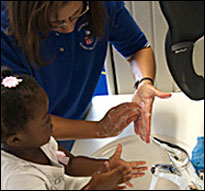
Children from low socioeconomic backgrounds frequently have greater difficulty paying attention, often mentally checking out of group lessons or playtime well before other kids do. Common behaviors include wandering off from sing-alongs and losing interest in cognitive exercises such as sorting shapes. Experts say this lapse of interest can be due to acute and chronic stress arising from more chaotic living conditions (crowding, family instability) that adversely affect brain development, particularly in the prefrontal cortex and hippocampus.
While education leaders have proposed a variety of interventions to improve attention span, a recent study shows that the answer is not necessarily in more class time with toddlers, but rather in greater outreach with parents.
The 2013 study, “Family-based Training Program Improves Brain Function, Cognition, and Behavior in Lower Socioeconomic Status Preschoolers,” by researchers at the University of Oregon and Willamette University, found that an eight-week intensive parenting class can do more for a child’s attention span than programming in preschools. Working with 141 children in a Head Start program, the researchers — Helen J. Neville, Courtney Stevens, Eric Pakulak, Theodore A. Bell, Jessica Fanning, Scott Klein and Elif Isbell — measured changes in children’s behavior after three different interventions. These interventions included an intensive, eight-week program for parents combined with some exercises with children; an eight week course involving parents one night a week; and mainstream Head Start programming. The study was published in the Proceedings of the National Academy of Sciences (PNAS).
The study’s findings include:
- Only children in the eight-week intensive parenting program displayed improvements in early attention processing between pre- and post-training. (More specifically, these improvements were related to increased cognitive “signal enhancement” as determined by electrophysiological assessments.)
- In laboratory assessments, children in the eight-week intensive parenting program made greater gains in nonverbal IQ, receptive language and pre-literacy skills than the other two interventions: “These results are particularly important because children’s IQ and early language abilities are predictive of school readiness and later academic achievement.”
- In parent assessments of children’s behavior, there were greater perceived improvements in social skills and improved behavior patterns in the eight-week parenting program. Teachers did not report a significant difference in behavior improvements among the three interventions.
- Self-reports and laboratory data confirmed that the family-intensive intervention reduced parental stress and improved language and interaction patterns.
The intensive parenting intervention consisted of eight weekly two-hour sessions with small groups, as well as seven follow up phone calls; their children participated in small group sessions (four to six children, two adults) on the same schedule. Parent groups focused on stress mediation with planning and problem-solving strategies, contingent-based discipline, parental responsiveness, language use with children and exercises to encourage attention. The child group activities were “designed to address the fundamental goal of improving regulation of attention and emotion states,” with activities centered on vigilance, selective attention and task switching. The entire intervention cost about $800 per child.
“The evidence presented here suggests that programs that target multiple pathways,” the authors conclude, “including parents and the home environment, have the potential to narrow the large and growing gap in school readiness and academic achievement between higher and lower [socioeconomic-status] children.”
Related research: A 2013 Stanford study found that slower development in language ability is already manifest among lower-income children as early as 18 months, when compared to peers in wealthier households.
Keywords: children, family
